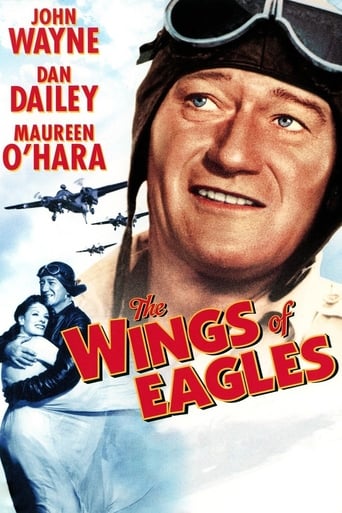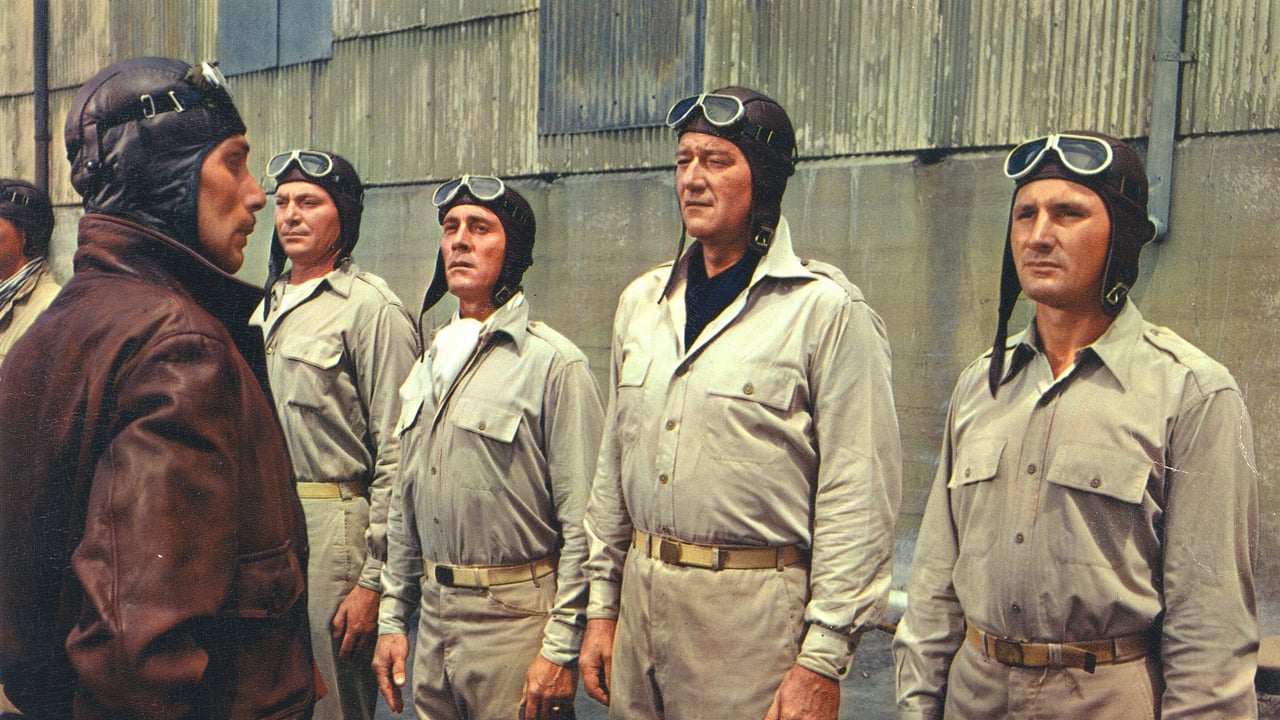ma-cortes
Wonderfully shot Ford film with a lively look at the spirit of Navy , including glorification of military life , familiar drama , love and sentimental nostalgia with interesting character studio of a varied assortment of individuals . It's a first-rate war melodrama , including comedy , and masterfully directed by the great John Ford . It's based on the life of one of America's greatest air heroes , Frank ¨Spig¨Wead , an Air hero who wrote plays about the war . He starred some rousing exploits in the ¨Schneider Cup Air Races¨. But he suffers a home accident and is interned in ¨San Diego National Hospital¨, and despite being crippled and wheel-bound he subsequently made a substantial contribution to America's war effort in the Pacific during WWII. He was a famous aviation pioneer become Hollywood screenwriter and one of them was ¨They were expendable (1945) ¨ directed by the same Ford and also with Wayne in the main role . This is a great and stolid drama, a John Ford's lusty realization and marvelously constructed. This classic picture ranks as one of the best of John Ford's work. It contains Ford's usual themes as familiar feeling , a little bit enjoyable humor, friendship and and sense of comradeship among people . Multiple highlights as the fights between Air and Army soldiers and of course the sensible final farewell on the carrier . Interesting screenplay portraying in depth characters and brooding events with interesting issues running beneath script surface is written by Frank Fenton, John Ford's habitual, and based on the life and writings of Commander Frank W. 'Spig' Wead . This excellent film featuring a magnificent performance by whole casting . Awesome John Wayne in a larger-than-life character . Enticing and intimate Maureen O'Hara in a sensible role with sensational acting . Excellent co-starring cast as War Bond as John Ford-alter ego, including pipe-smoking and hat . In the film appears , as usual , Ford's favourite actors as Ken Curtis , Mae Marsh , Kenneth Tobey, Willis Bouchey, Jack Pennick , some of them are uncredited . Good cinematography by Paul Voguel and jingoist musical score by Jeff Alexander. Rating : Better than average . Worthwhile watching .
moonspinner55
Frank "Spig" Wead's life story, as directed by real-life friend John Ford, starring John Wayne as the hot-shot aviation expert who transforms the U.S. Navy in the 1920s with his piloting prowess, rivaling (but not alienating) the Army in aviation power; later, after suffering a spinal cord injury and a separation from his wife and children, Wead discovers an untapped talent for writing, becoming a successful screenwriter and playwright! Ford bounces jovially from aerial slapstick to human drama to personal tragedy to wartime chaos, and, despite some bumps, keeps this biography lively and colorful. John Wayne and Maureen O'Hara, both of whom toss cigarettes and matches away with abandon, are reassuring as husband and wife, and though O'Hara's initial exit is perplexing, Ford's handling of the narrative doesn't jar us with unresolved feelings. The third act during WWII is just a jumble of patriotic scenes, but Wayne's expression at the finale is surprisingly genuine. He and Ford do Wead's incredible story justice. **1/2 from ****
Robert J. Maxwell
All the critics have called John Ford's humor "broad" and I guess this is a pretty good example of what they mean. The opening scenes involve ancient float planes, a Stutz Bearcat, people falling into water, and a crash into the swimming pool at the Admiral's tea party. (Tea party!) Subsequent scenes involve gala fist fights between matched hordes of Army and Navy pilots, led by Kenneth Toby and Wayne respectively. There are cakes smashed into faces. The whole thing could have been a silent comedy.And yet the humor, by no means ever sophisticated, is pretty funny at times, and not always slapstick either. A good example is the scene in Spig Wead's (John Wayne's) office, with Pincus (Tige Andrews) and Carson (Dan Dailey). Dailey is having difficulty trying to make a long-distance call. Andrews is sitting with his shoe off. Wayne asks what's wrong, did he stub his toe? "Ah, no," says Andrews, "ya see, I keep my money in my shoe and every time I step on it --" and he's interrupted when Admiral Moffat enters the room. Wayne, Dailey, and Andrews snap to attention and listen to the Admiral's speech. There is a brief pause after Dailey suddenly shouts into the phone, "Why don't you GET OFF THE PHONE, you dumb head!" In the sudden silence everyone stares at Dailey who then looks embarrassed and apologizes to the Admiral. When the Admiral has finished his speech to his respectful listeners he turns to leave the room and notices Pincus, a mere enlisted man, goes over to him and greets Pincus warmly. Pincus smiles easily, shakes the Admiral's hand, and inquires after his family. "How's da wife, sir? And dem lovely kiddies?" "Fine, fine. Good to see you, Pincus," says the Admiral and exits. Wayne and Dailey gape speechless at Pincus before getting back to business.I've described this scene in extenso because it could NOT have come from a silent comedy. None of the humor is physical. It's what might be called interactional humor. And Ford explains absolutely none of it. We have no idea why Dailey began shouting into the phone during the Admiral's speech, or what the hell kind of background the Admiral and the lowly Pincus share. There is no set-up for the gags whatever. They come as a shocking surprise and that's what makes them funny.There's a similar unstated quality at the climax of the film. Dailey has saved Wayne's life by taking the bullets himself. He winds up in sick bay playing poker with the other patients. Wayne visits him to thank him. The two have been lifelong friends. Ordinarily, under these conditions, a viewer expects to see a lot of sentiment, even between two plain-speaking macho loudmouths. Instead, Dailey brushes off Wayne's thanks brusquely. And later the two don't get together for Wayne's retirement from the ship and from the Navy after a heart attack, as if Wayne were leaving a drinking party for a few minutes to visit the bathroom. The sense of loss -- of almost tragic finality -- is underscored by the absence of any emotional display. And it is left unexplained by Ford, just as Dailey's phone call and Pincus's friendship with the Admiral was. This is anything but a routine scene.It's not among Ford's best films. He wanted to call it, "The Spig Wead Story," but the studio objected that no one would want to see it and they were right. Spig Wead sounds like a quarterback for Notre Dame. And the script, following Wead's real life meandering, is all over the place, switching in the middle from a service comedy to a complicated and unfocused story about a screen writer. And it doesn't tell us much about Wead's second career. "I didn't want to make it," said Ford about the movie, "but I didn't want anybody else to make it." Probably no one else would have made it.The romance between Wayne and O'Hara is handled clumsily. They're forever breaking up and getting together again -- or almost getting together. O'Hara is, as always, drop-dead gorgeous in Technicolor. And I doubt that anyone but Ford could have forced John Wayne to doff his toupee. Yet the acting itself is schematic, partly because the dialog is so burdensome. Who could possibly have made believable Wayne's lines after he has fallen down the stairs and broken his back? "Don't move me. My back. Can't feel anything. Call . . . hospital. Navy . . . hospital." Sounds like . . . comic book. At one point in the film, Ford ridicules himself ("John Dodge") instead of someone in his cast.The director was beginning to run out of steam by this time. He was over 60 and had a lot of scar tissue. Still, the movie is worth watching.
Ben Burgraff (cariart)
If John Ford hadn't made THE WINGS OF EAGLES, Commander Frank W. 'Spig' Wead would be best known today for the impressive collection of military-oriented stories he wrote for motion pictures, during the 30s and 40s. Among his credits are HELL DIVERS (with Wallace Beery and Clark Gable), TEST PILOT (with Gable and Spencer Tracy), DIVE BOMBER (with Errol Flynn and Fred MacMurray), and THEY WERE EXPENDABLE (for John Ford, with John Wayne and Robert Montgomery). He brought to his writing a love of flying, pride in the military, and an understanding that a 'greater good' must sometimes take precedence over personal happiness.In THE WINGS OF EAGLES, director Ford illustrates how Wead's life was every bit as interesting and dramatic as anything he wrote. A close personal friend (so much so that he even cast Ward Bond to play a thinly-disguised version of himself, named 'John Dodge', in the film), Ford was witness to many of the triumphs and tragedies of the pioneer Naval aviator/engineer's life. After completing THE SEARCHERS, Ford commemorated the tenth anniversary of his friend's passing with this sensitive, 'warts-and-all' tribute.Wead (portrayed by John Wayne, in one of his most fully realized characterizations...he even sacrificed his hairpiece, as the older Wead, for the sake of authenticity), begins the film as a typical hell-raising Ford hero, a Navy flier who loved taunting his Army counterparts (led by the terrific Kenneth Tobey), lived for the sheer joy of flying bi-planes (even when he was clueless as to HOW to fly them), and had the love of a feisty yet devoted woman (Maureen O'Hara, of course!) But, in keeping with the tone of much of the older Ford's work, Wead's life does not tie itself up into a neat, happy package, but develops into a complex near-tragedy of a man so consumed with his career that his marriage breaks down, and has his greatest dream snatched away from him when an accident cripples him. Rather than falling back on the potential aid a wife could provide, he refuses her help, relying on his Navy 'family' (represented by Dan Dailey, in one of his most popular roles) for rehabilitation. With Pearl Harbor, Wead's expertise is again called upon, and he leaves a successful career as a screenwriter to rejoin the Navy, becoming the innovator of jeep carriers...only to see his health fail him, yet again, forcing him out of the service he loved.
It is a story both sad and moving, and Wayne, so often accused of being 'bigger than life' and one-dimensional in his portrayals, again demonstrates his underrated acting talent, capturing the frustration of a man who never truly achieves the ultimate triumphs he dreams of. Wead is a 'real' person, not always likable, but someone you learn to admire for his sheer determination to contribute, and not surrender to self-pity.With an excellent supporting cast (particularly Ken Curtis, as Wead's lifelong friend, John Dale Price), THE WINGS OF EAGLES may disappoint someone looking for a 'typical' war movie, but, as a film biography, is far more honest than Hollywood's 'usual' hokum. 'Spig' Wead would have loved it!



 AD
AD



